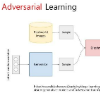We propose an adversarial learning approach to the generation of multi-turn dialogue responses. Our proposed framework, hredGAN, is based on conditional generative adversarial networks (GANs). The GAN's generator is a modified hierarchical recurrent encoder-decoder network (HRED) and the discriminator is a word-level bidirectional RNN that shares context and word embedding with the generator. During inference, noise samples conditioned on the dialogue history are used to perturb the generator's latent space to generate several possible responses. The final response is the one ranked best by the discriminator. The hredGAN shows major advantages over existing methods: (1) it generalizes better than networks trained using only the log-likelihood criterion, and (2) it generates longer, more informative and more diverse responses with high utterance and topic relevance even with limited training data. This superiority is demonstrated on the Movie triples and Ubuntu dialogue datasets in terms of perplexity, BLEU, ROUGE and Distinct n-gram scores.
翻译:我们建议对生成多方向对话响应采取对抗式学习方法。 我们提议的框架( hredGAN ) 以有条件的基因对抗网络为基础。 GAN 的生成器是一个经修改的等级级常数编码解码网络(HRED ), 歧视器是一个单向双向双向RNN, 与生成器共享上下文和词嵌入。 在推断过程中, 以对话历史为条件的噪音样本被用来破坏生成器的潜在空间, 以生成几种可能的响应。 最后的响应是导师的排名。 HredGAN 显示现有方法的主要优势:(1) 它比仅使用日志类标准培训的网络要好, (2) 它产生更长、 更丰富信息和更多样化的响应, 即使在培训数据有限的情况下, 也具有高度的直白和主题相关性。 这种优势表现在三部电影和Ubuntu对话数据集上, 包括易读性、 BLEUEUGE、 ROUGE 和独特n-gram 评分数。




